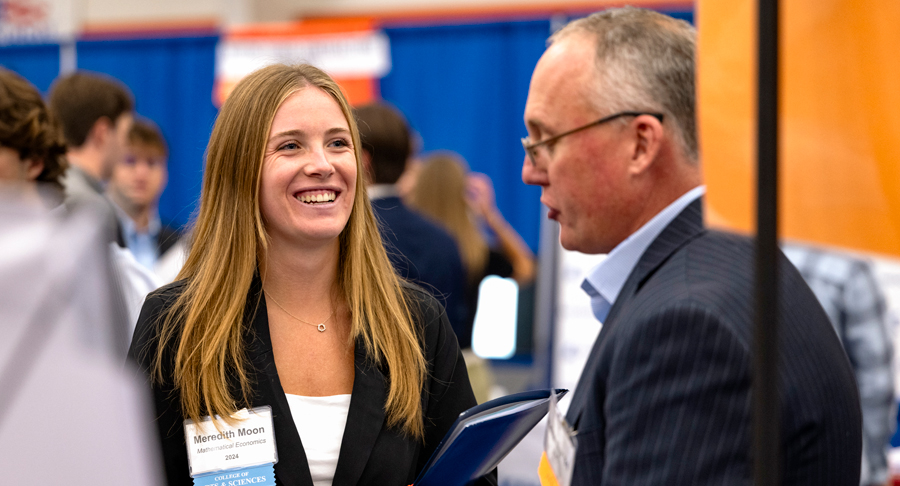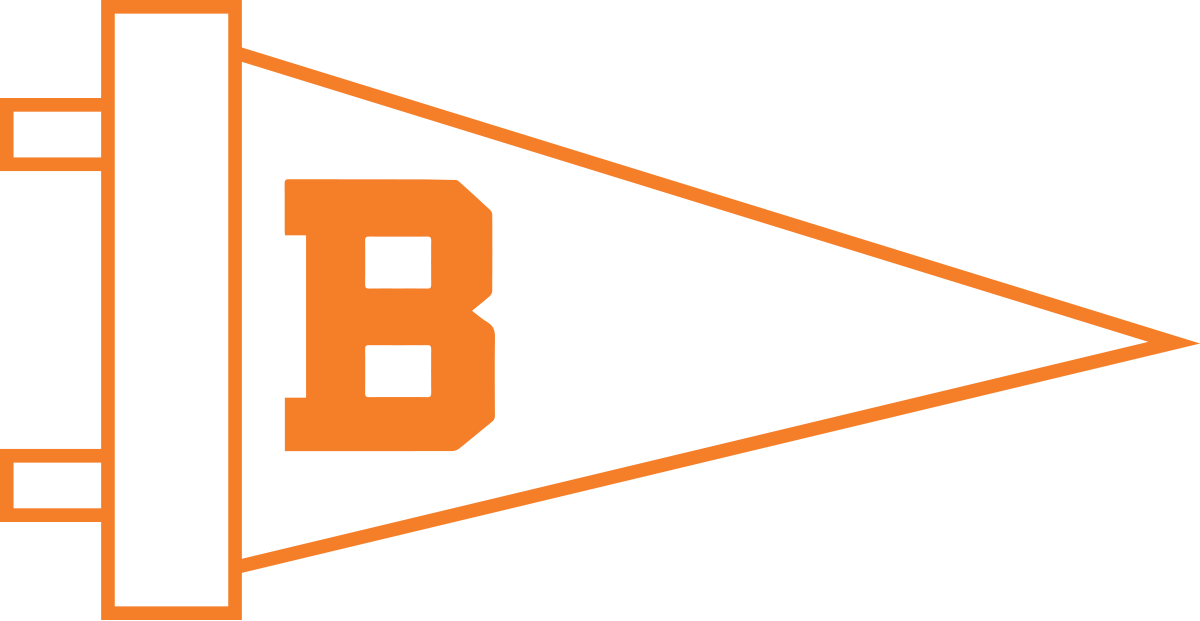
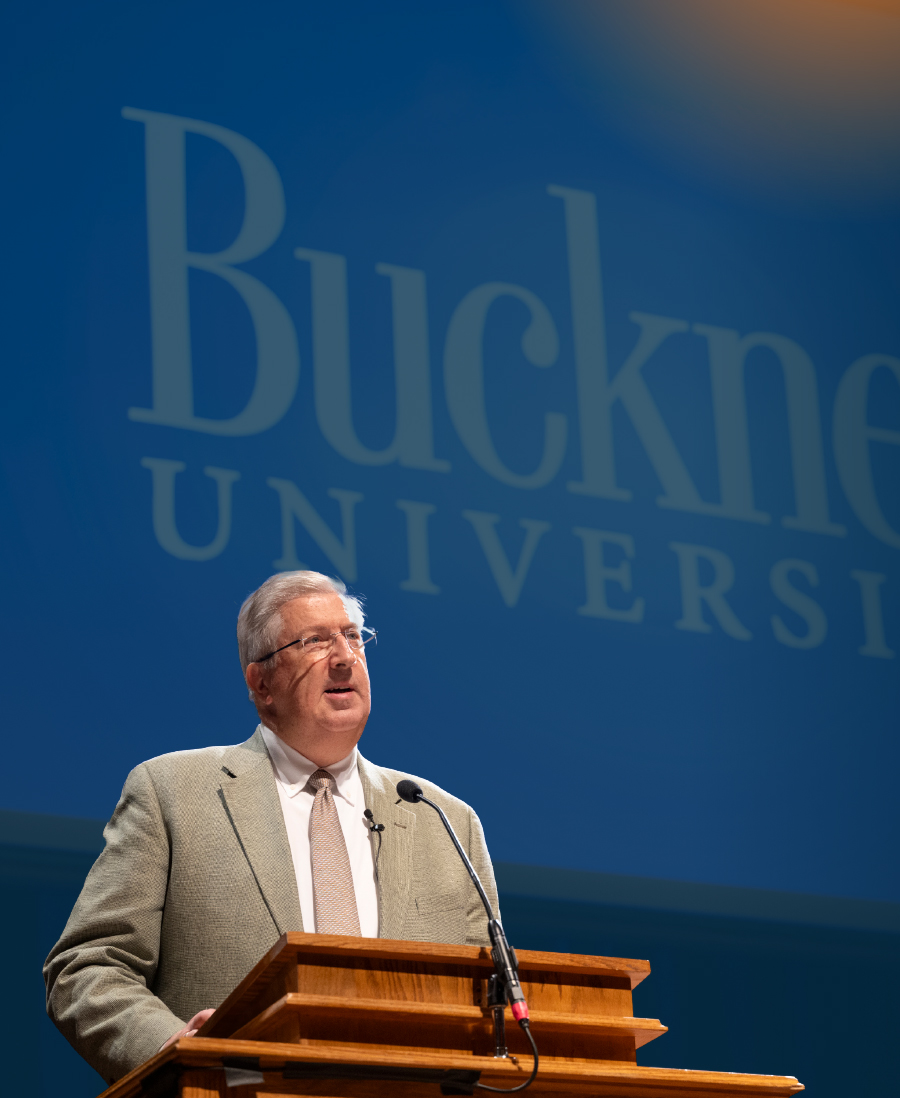
Dear Bucknellians,

s president, I believe it is vitally important to keep the worldwide Bucknell community well informed about what’s happening on campus — particularly the recent successes we’ve achieved as we work to meet the goals of The Plan for Bucknell 2025. This special edition of Bucknell Magazine is devoted to our second annual University Report, which explores the strategic initiatives and programs that are enriching the educational experience we offer our students.
Since Bucknell’s founding in 1846, our unwavering focus on the future has allowed us to anticipate challenges and adapt to changing times. Past stewards of the University honored tradition while looking ahead and making plans to meet the needs of generations not yet born — the students we are privileged to serve today.
Every decision we make here at Bucknell directly benefits students and helps ensure that they graduate prepared to succeed. Our holistic approach to educating the whole student, both in and out of the classroom, includes many exciting additions to University life — from the Center for Access & Success and Gateway Scholars program to new interdisciplinary academic initiatives, residence halls and an athletics complex.
There is so much more to be proud of, and I hope you enjoy reading about these and other accomplishments in this special edition of the magazine. No matter your class year, and no matter where you live or what you do, you are part of the Bucknell story — and the best chapters are yet to come.
Sincerely,

Table of Contents
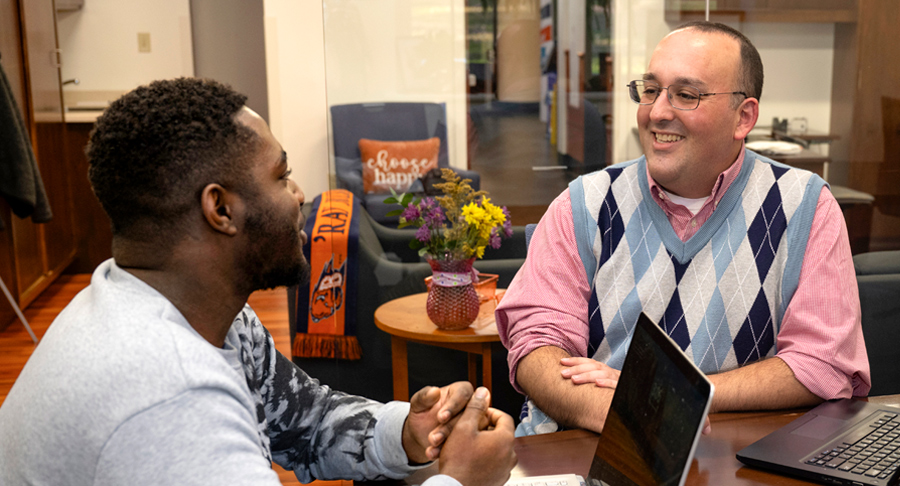
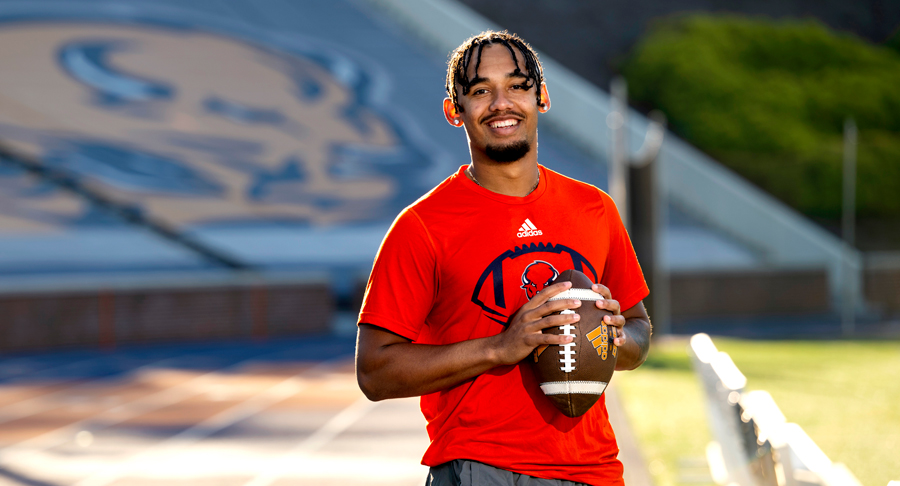
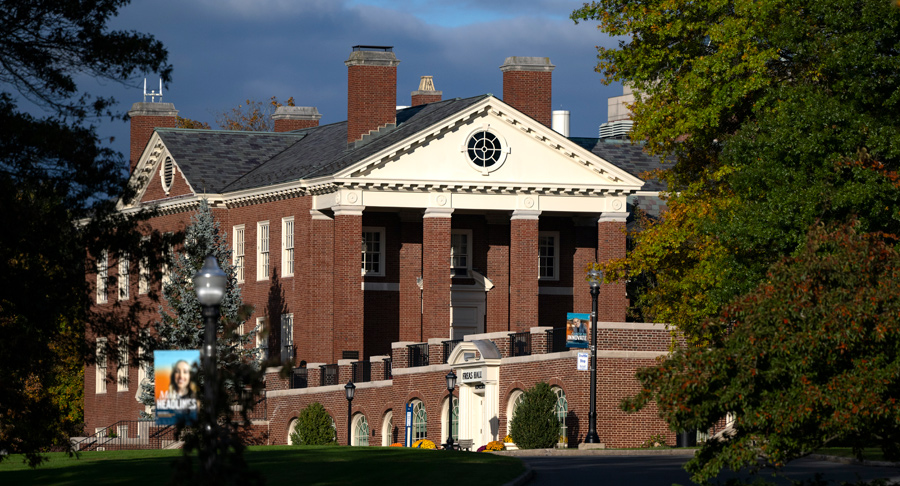
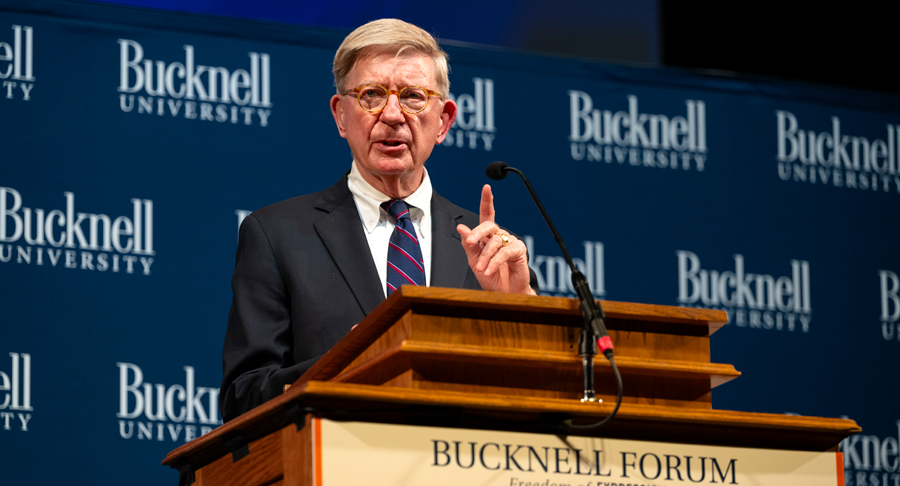
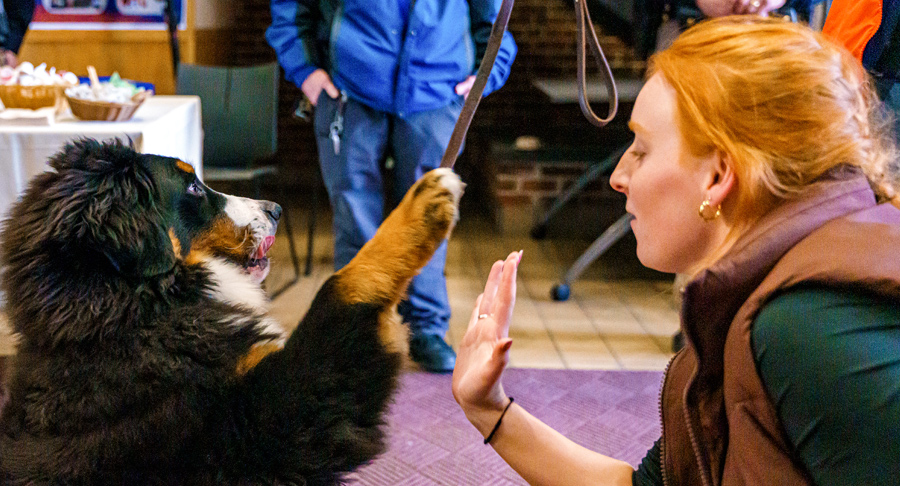
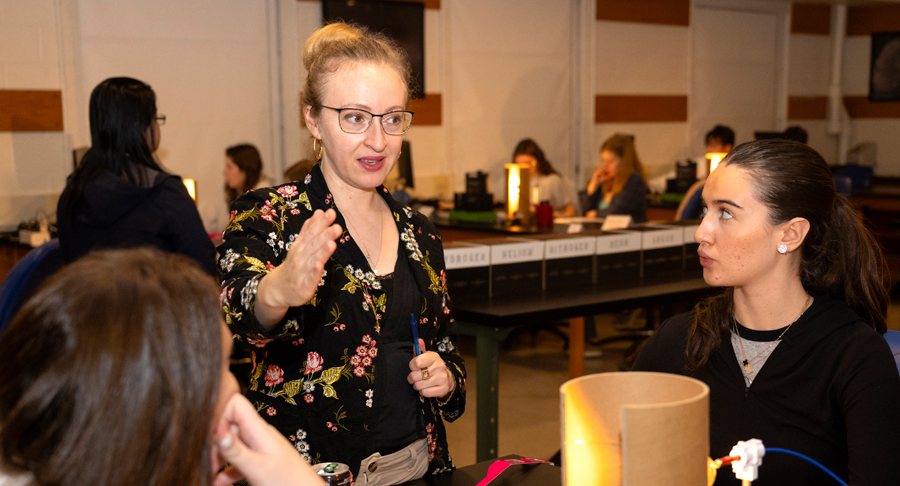
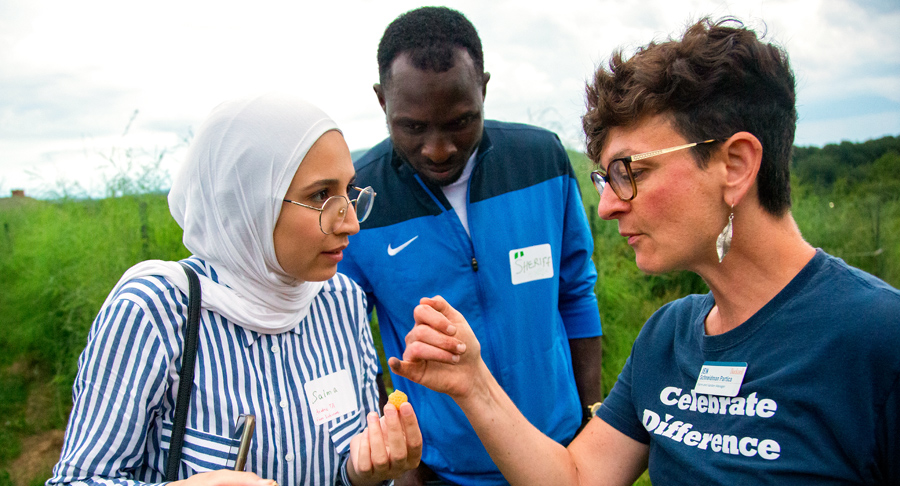
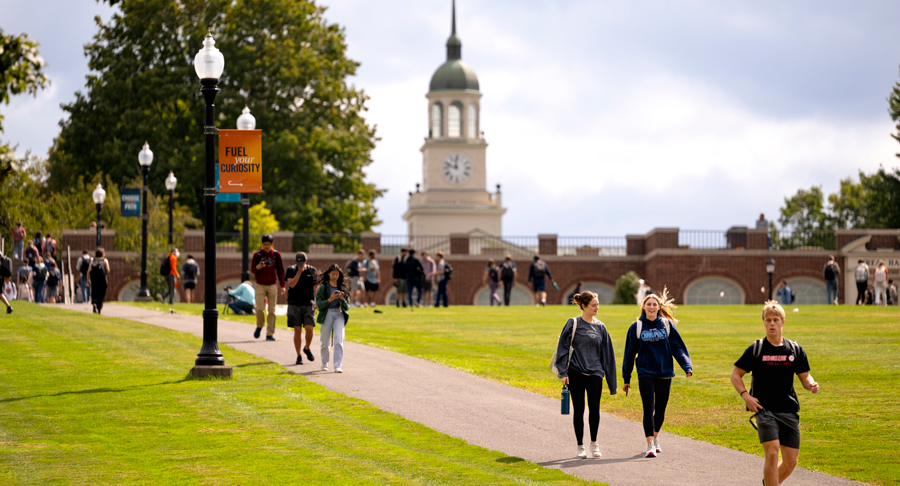








bucknell.edu/bmagazine
Contact
bmagazine@bucknell.edu
Class Notes will resume in the Spring 2024 issue
classnotes@bucknell.edu
(ISSN 1044-7563), of which this is volume 17, number 1, is published in winter, spring, summer and fall by Bucknell University, One Dent Drive, Lewisburg, PA 17837. Periodicals Postage paid at Lewisburg, PA, and additional mailing offices.
Permit No. 068-880.
49,000
Postmaster
Send all address changes to:
Office of Records
301 Market St., Suite 2
Bucknell University, Lewisburg, PA 17837
© 2024 Bucknell University
Champions for Belonging
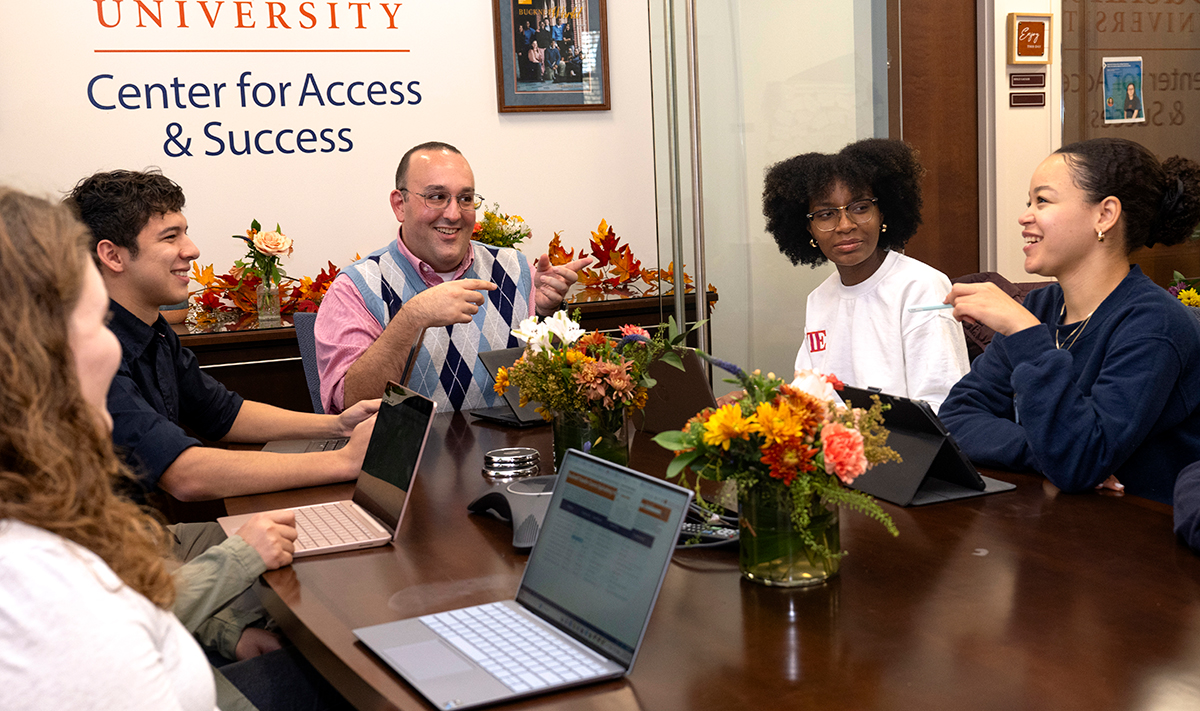
Developing the Center for Access & Success
t Bucknell’s Center for Access & Success, Chris Brown (center), the Andrew Hartman ’71 & Joseph Fama ’71 Executive Director, is building programs that enhance the Bucknell experience for high-achieving students who are part of the University’s five pathway scholarship programs.
In his first months with the University, Brown and his team have developed definitions of access and success to guide strategic decision-making. They are collecting information to better understand students’ current sense of belonging across Bucknell’s social, academic and campus communities so they can make informed decisions — and have a benchmark for measuring future success. “We want students to recognize that the resources offered here belong to them. Their library, their labs, their support services, their experiential learning opportunities — they’re all in place to be used freely,” Brown says.
He is also examining University structures and policies and identifying potential barriers. “Our overarching goal is to reduce or remove obstacles that may inhibit a student’s ability to enroll, persist and graduate,” Brown says. “We are being intentional about the ways we build genuine connections and invite students into spaces of belonging.”

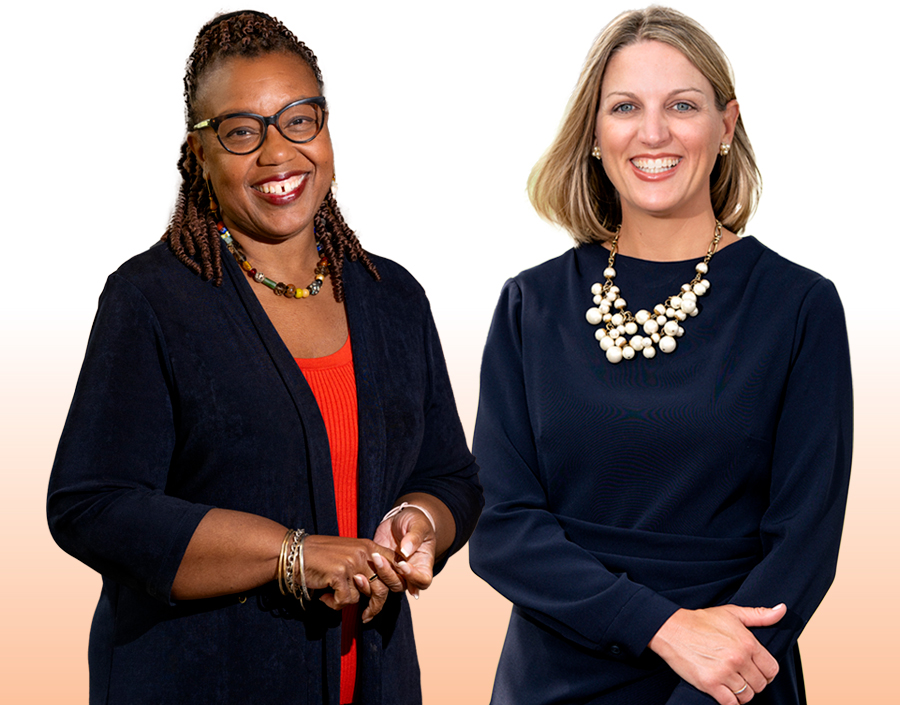
Leaders with Vision
hen Vernese Edghill-Walden ’87 (below, left) joined Bucknell in July as the inaugural vice president of equity & inclusive excellence, she saw the opportunity to drive belonging across campus. Partnering with Lisa Keegan (below, right), vice president for student enrollment, engagement & success, she is working to combine the strengths and expertise of their divisions to develop a deep understanding of the challenges and opportunities ahead in their work. The pair held collaborative retreats and plan to host more joint team meetings where they will create strategic short- and long-term priorities for their divisions. “Our teams are moving forward together,” Keegan says. “We are all committed to and focused on the same goal.”
Admissions Success
4.5% international students
22% students of color
13.5% first-generation students
27 TRANSFER STUDENTS
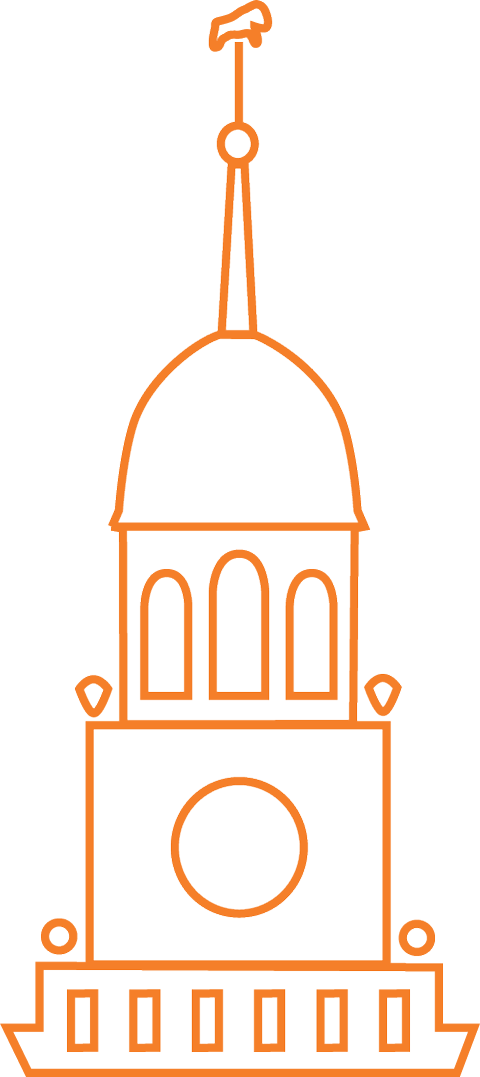
The Bucknell Journey
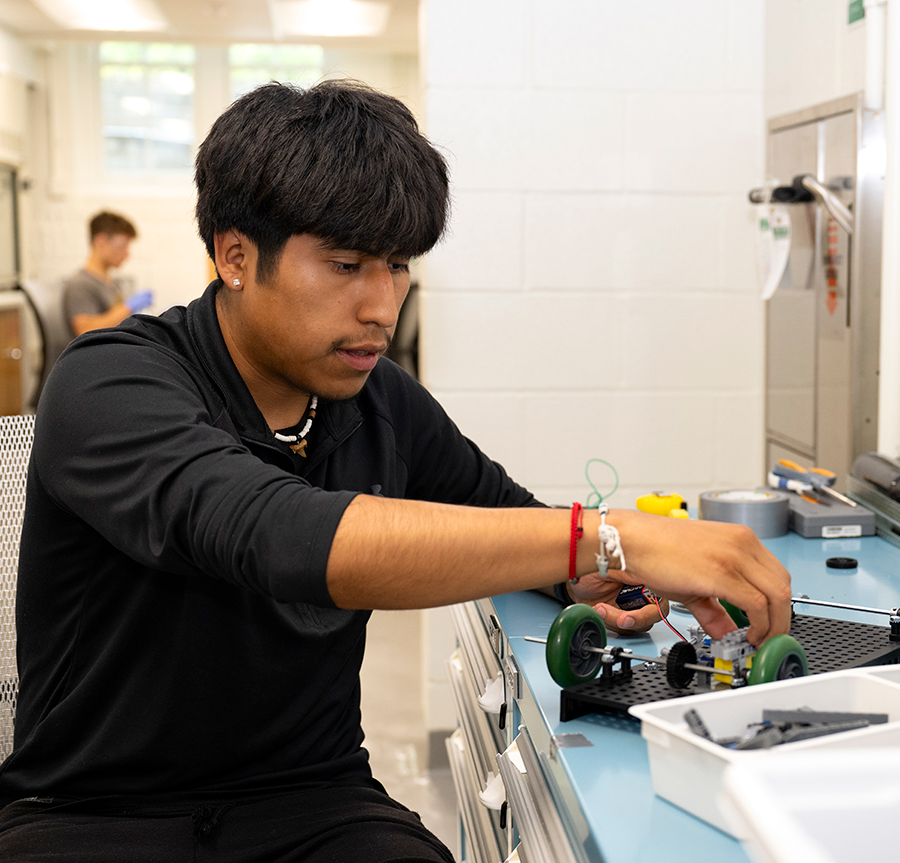
Brian Rios-Saldivar ’27
- Is a member of the inaugural cohort of Gateway Scholars, a program supported by the new Center for Access & Success
- Attended Bucknell’s summer Engineering Camp
- Participated in the Engineering EXCELerator program
- Participated in Pre-Orientation
Belongs to:
- Engineering Success Alliance
- Engineering Student Board
- American Society of Mechanical Engineers
- Society of Hispanic Professional Engineers
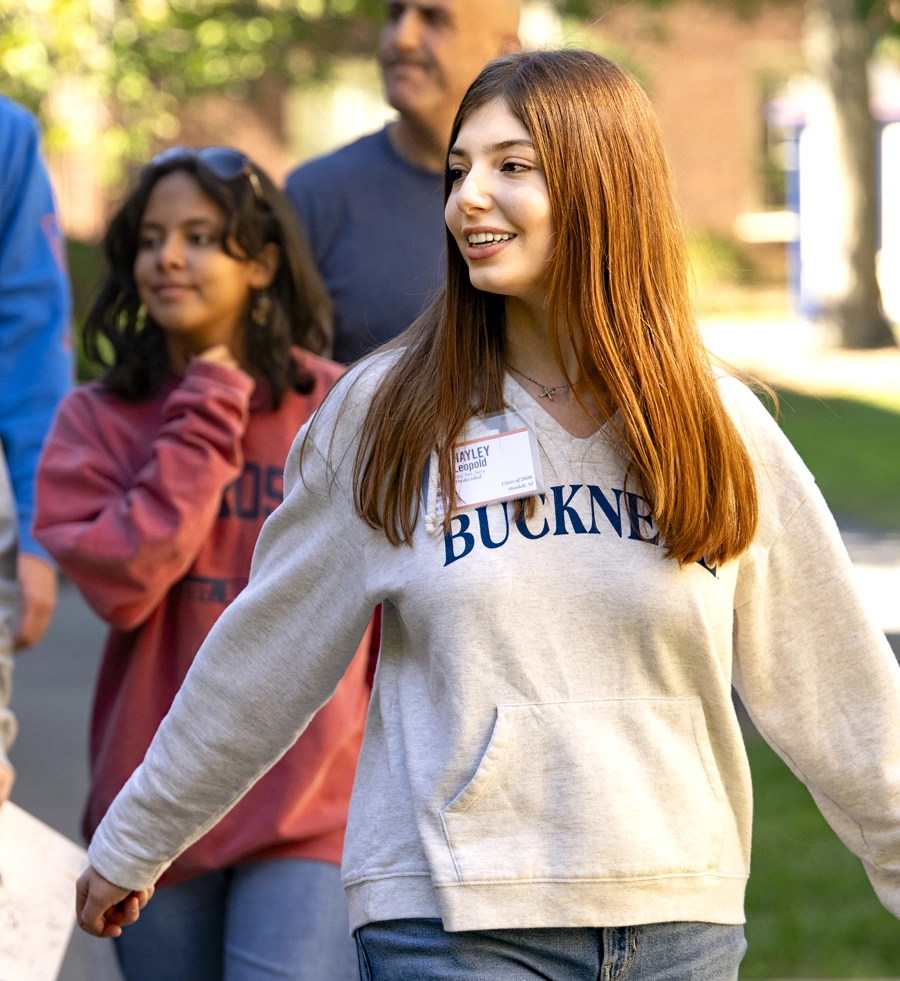
Hayley Leopold ’26
- Interacts with prospective students and families as an admissions ambassador
- Facilitates study groups at the Teaching & Learning Center
- Writes and edits for The Bucknellian
- Is vice president and a founding member of Chabad, a Jewish student group
- Engages with programming offered by the Center for Career Advancement
- Plays club volleyball
- Mentors first-year students through the College of Arts & Sciences’ Peer Mentor Collective
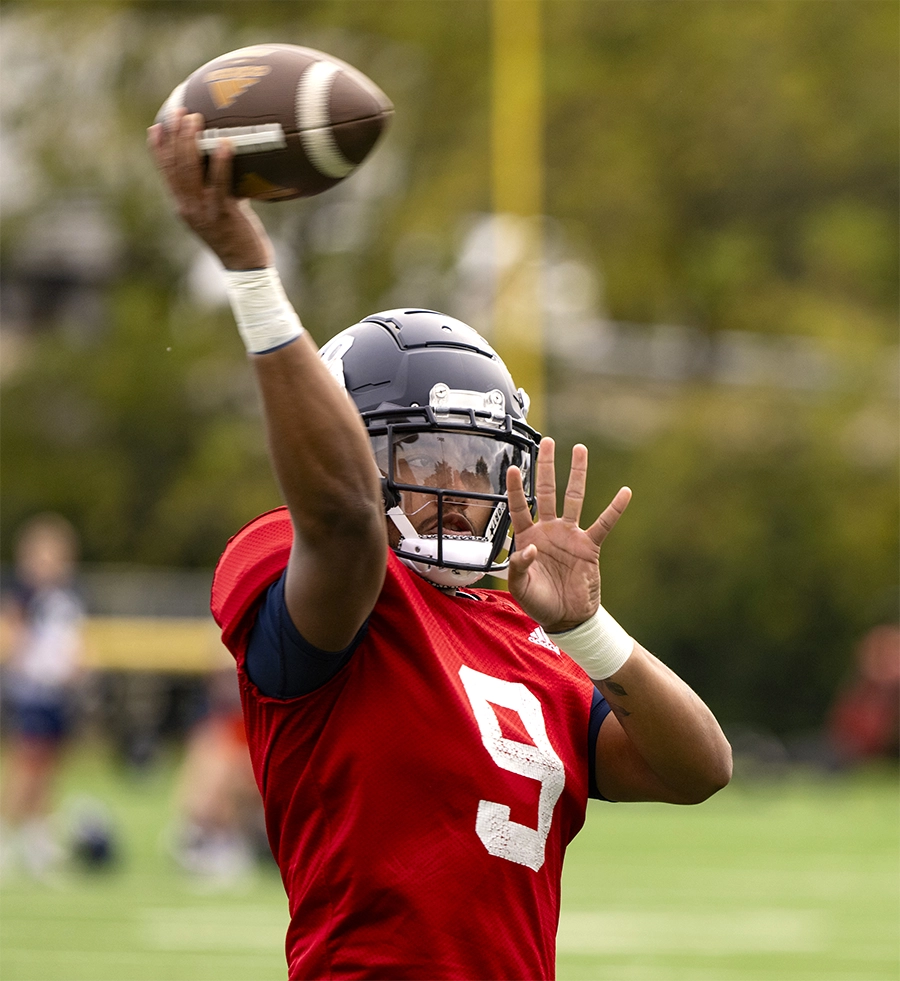
Michael Hardyway ’25
- Earned his position as quarterback of Bucknell’s football team as a walk-on student-athlete
- Serves as a student ambassador for the Bucknell Center for Sustainability & the Environment (BCSE)
- Conducted two research projects for the BCSE on solar energy and carbon sequestration in trees
Belongs to:
- GenFirst! mentor program
- Fellowship of Christian Athletes
- Bison Athletes of Color
- Student-athlete Advisory Committee
- Bison Cares, a student-athlete community service group
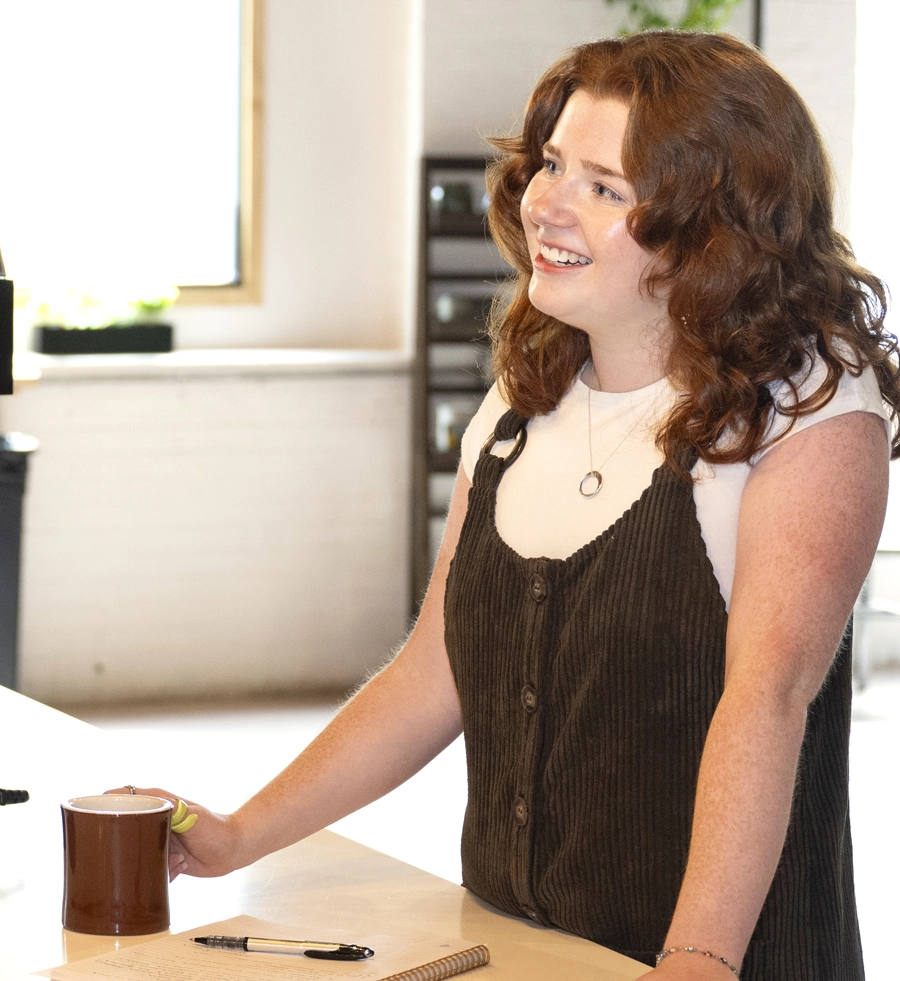
Libby Hoffman ’24
- Serves as an executive intern in the Office of the President
- Performs in theatre stage productions
- Conducted coffee research as an Emerging Scholar with Jonathan Scholnick, visiting assistant professor of anthropology
- Studied abroad in Italy
- Helped new students acclimate to campus life as an Orientation Assistant
Markers of Excellence
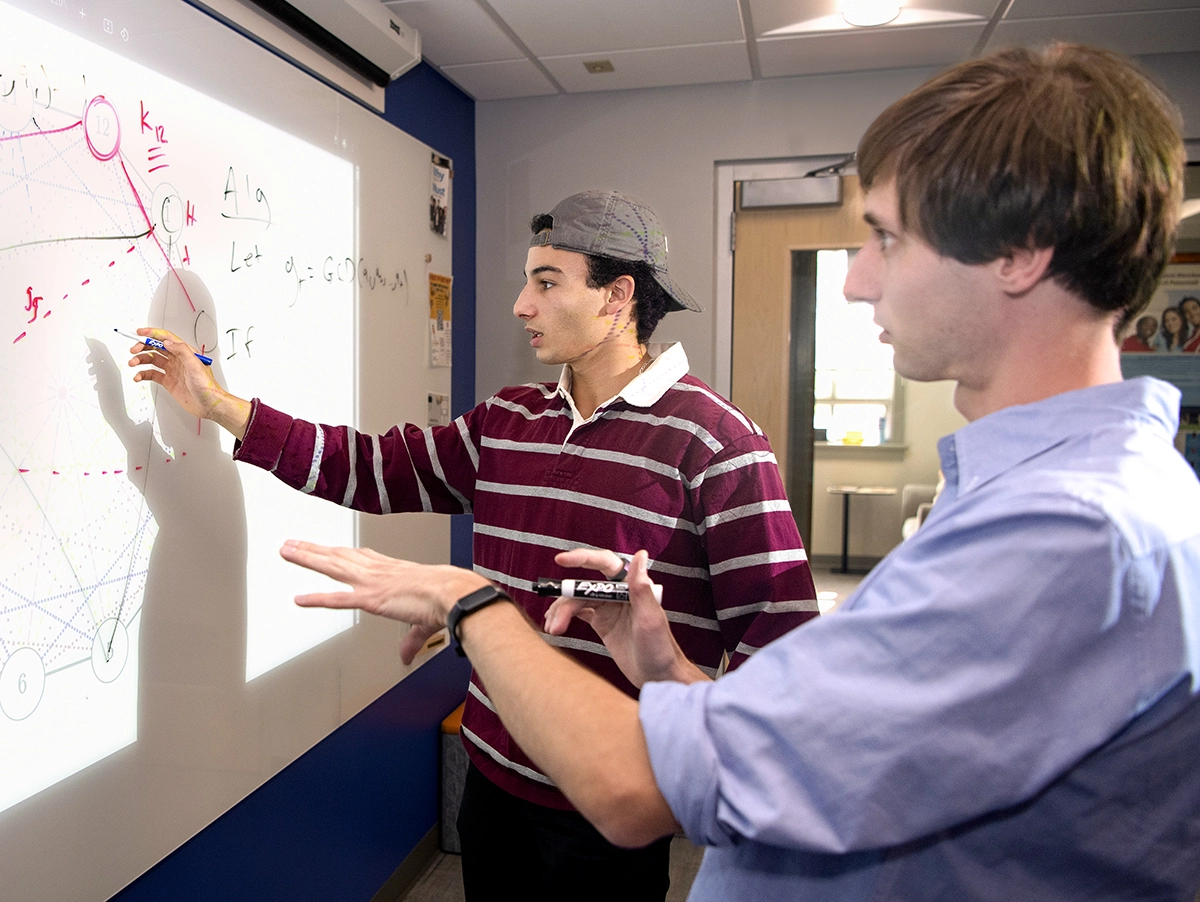
The Dominguez Center for Data Science
ata is ubiquitous, a pivotal force in informed decision-making throughout industries. At Bucknell, students are poised to embrace the power of data across all disciplines and learn how to apply it effectively to their future professions thanks to a generous founding gift from Michael J. Dominguez ’91.
Launching in 2024, the Dominguez Center for Data Science will equip Bucknell students with the skills to address global challenges in the digital age. By integrating data science into a wide range of academic programs, the center will offer hands-on experiences that help prepare students for career success and emphasize the ethical treatment of data collection and use.
Dominguez, a Bucknell trustee who serves as chief investment officer and senior managing director at Providence Equity Partners, envisions programming that encourages collaborative problem solving, reflecting efforts seen in the corporate world. “Irrespective of the fields students pursue, data will be an increasingly important component of their careers,” Dominguez says. “It serves as the foundation for decision-making and drives innovation in areas like artificial intelligence, machine learning and predictive analytics. Data is critical to the future of any business or initiative.”
The vision for the center emerged through a benchmarking study performed by an interdisciplinary faculty team that includes Freeman College of Management Professor Matt Bailey, analytics & operations management; College of Arts & Sciences Professor Peter Brooksbank, mathematics; and College of Engineering Professor Brian King, computer science. They found Bucknell to be well positioned for distinction in the field because of its three-college structure and program offerings that apply data science in ways that push beyond the assumed boundaries of data as a discipline.
“Bucknell students have already excelled in data science, from Broadway and NFL analytics to solving big-data challenges,” says Samuel Gutekunst (above right), the John D. and Catherine T. MacArthur Assistant Professor of Data Science. “The center will unite efforts across all three colleges and will foster impactful, real-world collaborations.”
Professor John Hunter,
comparative humanities
Action for Accreditation
Accreditation is proof that colleges and universities uphold and promote educational standards and quality. It provides confidence to prospective employers, allows for transfer of credits and the awarding of federal financial aid, and offers accountability for an institution’s commitment to continuous improvement.
In 2024, reviewers from the Middle States Commission on Higher Education will examine Bucknell’s efforts to uphold the seven accreditation standards and 15 requirements of affiliation, verifying our continued effectiveness and recognition as a university.
A Forum for Free Expression
Sarah Downey ’25, political science and Italian studies
ultivating an environment where academic inquiry, intellectual curiosity and open dialogue thrive has become a high-stakes endeavor for colleges and universities.
Amid national tensions surrounding diverse perspectives in education, Bucknell University is demonstrating its commitment to freedom of expression. The reinvigoration of its national speaker series is a tangible example of how the institution values the open exchange of ideas on campus.
The Bucknell Forum invites speakers from across the political and ideological spectrum to discuss topics related to an annual theme. For the 2022-23 series relaunch following a COVID-19 hiatus, high-profile figures — including Republican Condoleezza Rice and Democrat David Axelrod — addressed “The State of American Democracy.” The 2023-24 Bucknell Forum brings writers, activists and scholars to campus to explore “Freedom of Expression.”
Conservative Washington Post columnist George F. Will kicked off the series in September with his thoughts on the politicization of everyday life. “This saturation [of politics] will inevitably mean controlling what people say and hear and read and think and teach,” Will said. “Ultimately, this idea is the source of totalitarianism, which is the totalizing of politics.” (For full coverage,
visit go.bucknell.edu/george-f-will)
Jon A. Shields — a professor of American politics, chair of the government department at Claremont McKenna College, and author or co-author of three books on the American right — followed in October, discussing the dynamics of the Republican party, including how its own cancel culture counters the party’s claim of partisan agreement. (Learn more at go.bucknell.edu/jon-a-shields)
In the spring, Bucknell will welcome New York Times-bestselling author Jodi Picoult, award-winning writer George M. Johnson, and Academy Award-winning actor and activist Jane Fonda.
Most Bucknell Forum speakers arrive on campus a few hours ahead of the evening event in order to visit classes, giving students the opportunity to engage with them in a small-group setting.
“Ensuring that we have different viewpoints represented on campus benefits our students, faculty and staff,” says Heather Johns P’27, vice president for marketing & communications. “We are demonstrating the value of listening to other voices and engaging in thoughtful conversations with someone you may not agree with. Doing so prepares our students to be successful citizens in a world that’s filled with different perspectives, identities and experiences.”
The Bucknell Forum has sparked interest from other institutions hoping to replicate its success by launching their own speaker series.
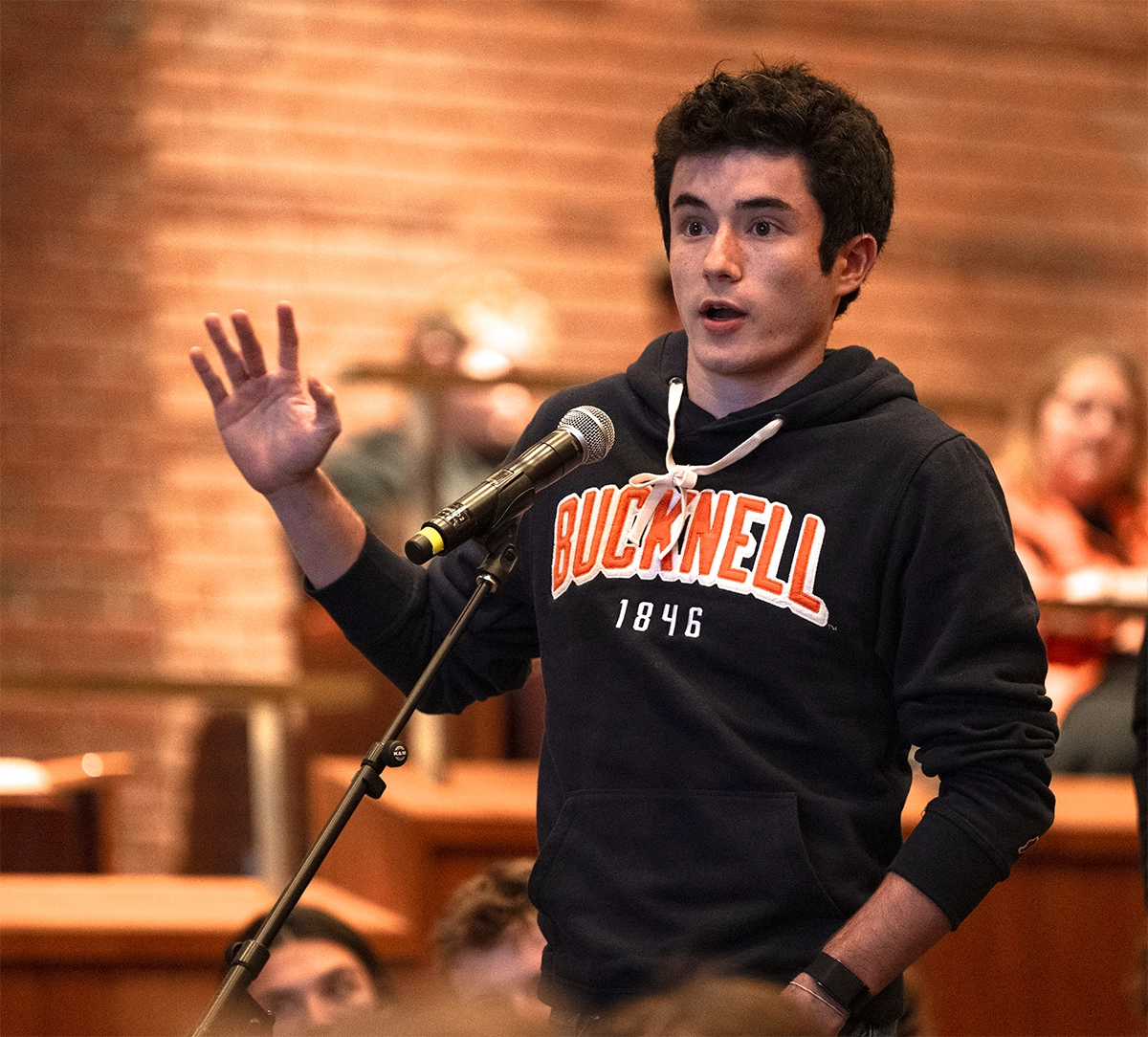

Professor Chris Ellis ’00, political science
Elevating Campus Life
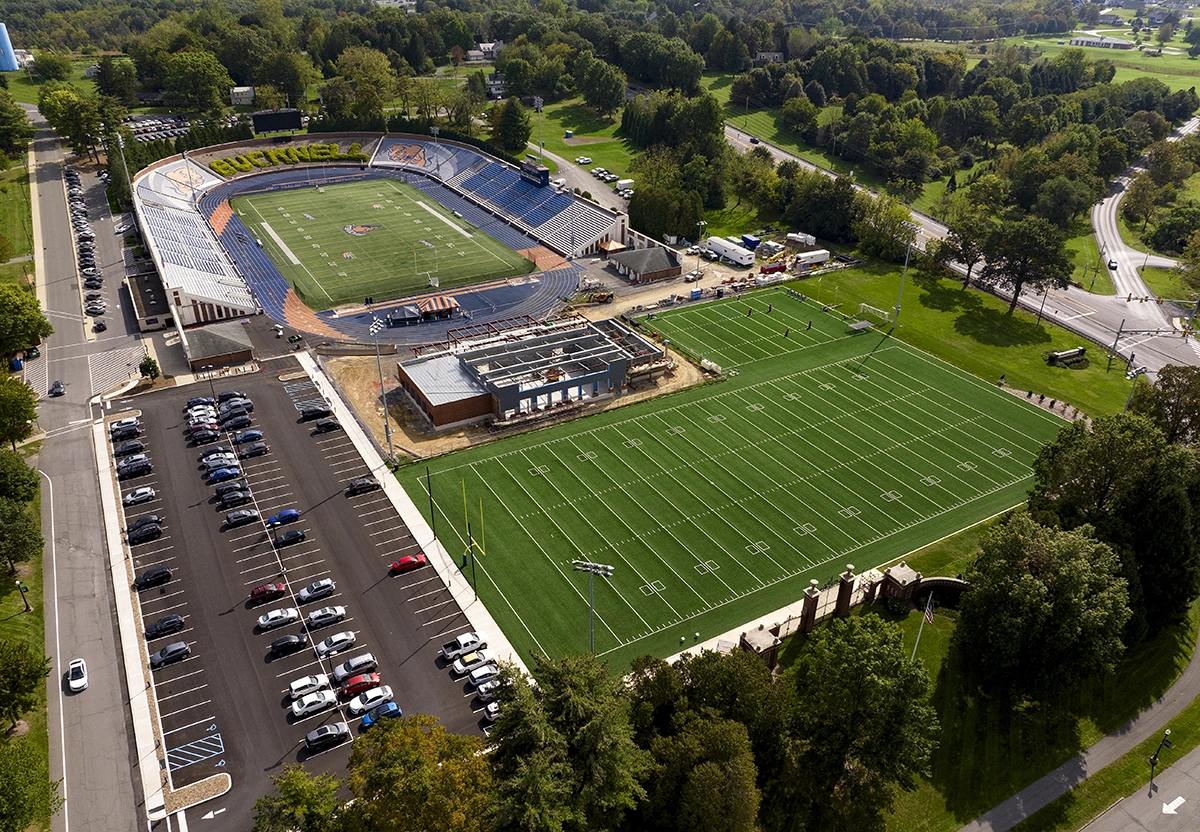
Upgrading Facilities

Safe and Connected

ince arriving on campus in 2022, Chief Anthony Morgan has made strides in integrating community-building into Public Safety operations. To strengthen relationships between law enforcement officers and students, he has instituted several new initiatives.
Community Service Officers These unarmed officers can respond to routine Public Safety calls, such as vehicle and room lockouts, vehicle jumpstarts and safe escorts. Morgan says he hopes to hire two more officers, who will also be tasked with building community through campus initiatives.
New BSAFE App Students now have several safety tools right at their fingertips. The free app allows them to use their phones as a mobile blue light to request Public Safety’s immediate assistance; report a tip with photos or video to aid the response; request a “friend walk,” allowing a friend or family member to virtually follow them to a destination; and use a “social escape” feature to assist leaving an uncomfortable situation.
Emotional-support Companion Digger, a Bernese mountain dog, has joined the squad. “When Digger is walking around campus with an officer, students approach them, which helps spark a conversation and build a connection.” Digger is also available to provide comfort and help Public Safety facilitate conversations with people who have experienced difficult events. Digger, who is owned by financial aid assistant Kelly Pastuszek, is handled during his shifts by Community Service Officer Bonnie Rake.
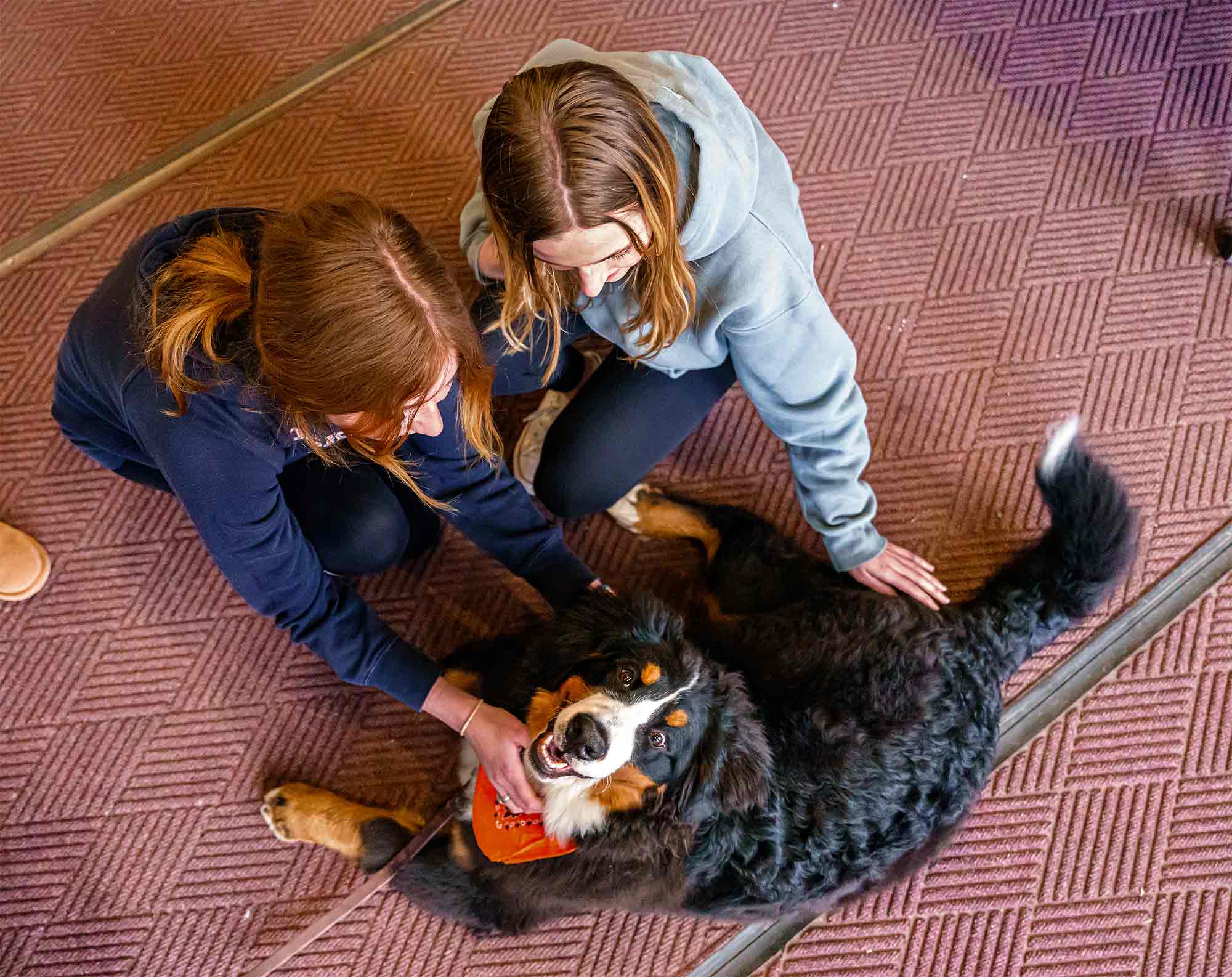
Success Defined
Our alumni are difference-makers. Regardless of their area of study at Bucknell, they capitalize on their distinct experiences to establish careers with purpose. They become award-winning screenwriters and creative producers, contribute to the development of future-focused city infrastructure and lead productive conversations on the state of our nation. They are bold, undeterred by challenges and confident in their ability to make a difference in the world.
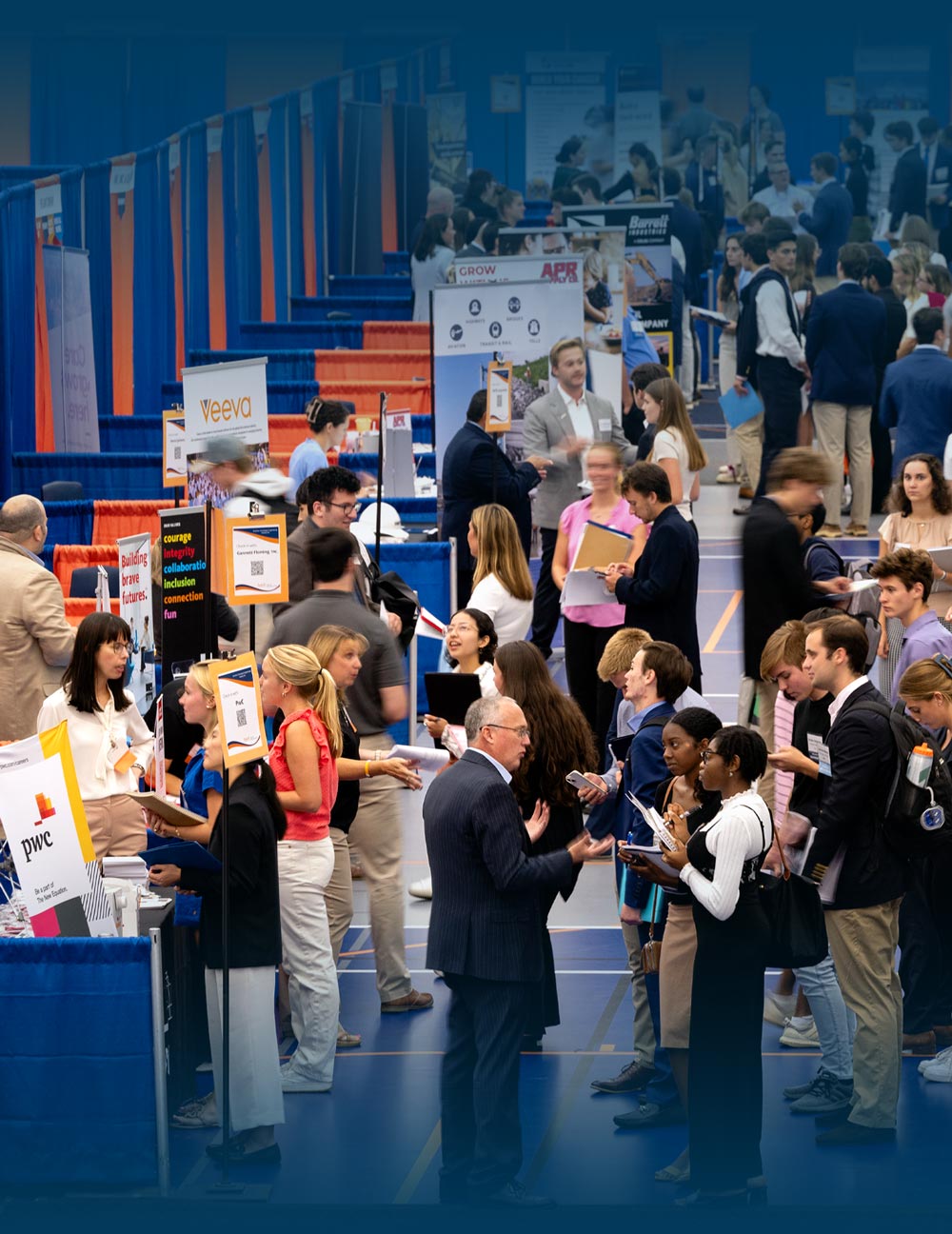
Class of 2022 Snapshot
Graduates of the Class of 2022 reported high satisfaction with their Bucknell outcome via the Center for Career Advancement’s annual post-graduate outcomes survey.
99%
of graduates responded
95%
Satisfied or very satisfied with their outcome
94%
Secured opportunities within nine months of graduation
$69,540
Average starting salary
Employed
6%
Volunteer/Service Program, Military, or
18%
Entered graduate school or other continuing education
The Center for Career Advancement hosts several career fairs on campus each year. Nearly 100 alumni and parents from the business, consulting and engineering industries attended this one in September.
Career Prep for Credit
reparing students for successful careers is a multifaceted and complex undertaking. To set students up for post-graduation success, the Center for Career Advancement (CCA) has launched multiple for-credit career courses that thread career preparation into the academic journey.
“Our students have a lot of great intentions, but life gets busy and academics take priority,” says Pamela Keiser P’20, executive director of career services. “So we’ve built career preparation into the academic structure they already know. It pushes them forward so they understand how to pursue a career they find fulfilling.”
The courses cover topics including self-discovery and industry exploration and teach practical job search skills. Students develop ePortfolios, craft polished resumes and create engaging LinkedIn profiles. The CCA invites alumni and employer guest speakers who share perspectives and underscore the importance of networking.
Nearly 500 students enrolled in the courses the first year they were offered in fall 2022. Course evaluations revealed that 90% of enrolled students reported feeling increased comfort levels with regard to major choice and career decision-making.
“These courses are intended to help students from all three colleges capitalize on their education and identify their ideal career path,” says Keiser. “And our combined efforts clearly indicate how Bucknell is evolving to meet the expectations of the modern job market.”
CCA’s Career Courses
Exploring Pre-health introduces students to the breadth of health care jobs and helps them chart their ideal career path.
Pursuing Pre-health guides students through the process of applying to professional schools.
Exploring Pre-law introduces students to the field of law and the legal profession.
Pursuing Pre-law prepares students for the law school application process.
Hayley Leopold ’26, economics and psychology
Hayley Leopold ’26 (center) decided to take the Jump Start Your Career course as a sophomore to get a better sense of potential career paths.
Learning from the Best
Learning from the Best
Star Power
rofessor Jackie Villadsen, physics & astronomy, is helping to answer one of science’s burning questions: Are there Earth-like planets in far-off solar systems? To find out, she and her research team are studying bursts of radio waves from stars such as the red dwarf YZ Ceti, which lies 12 light-years away from our solar system. She documented findings in the journals Nature Astronomy and Nature, which generated news media coverage from outlets including CNN, The Atlantic and The Weather Channel.
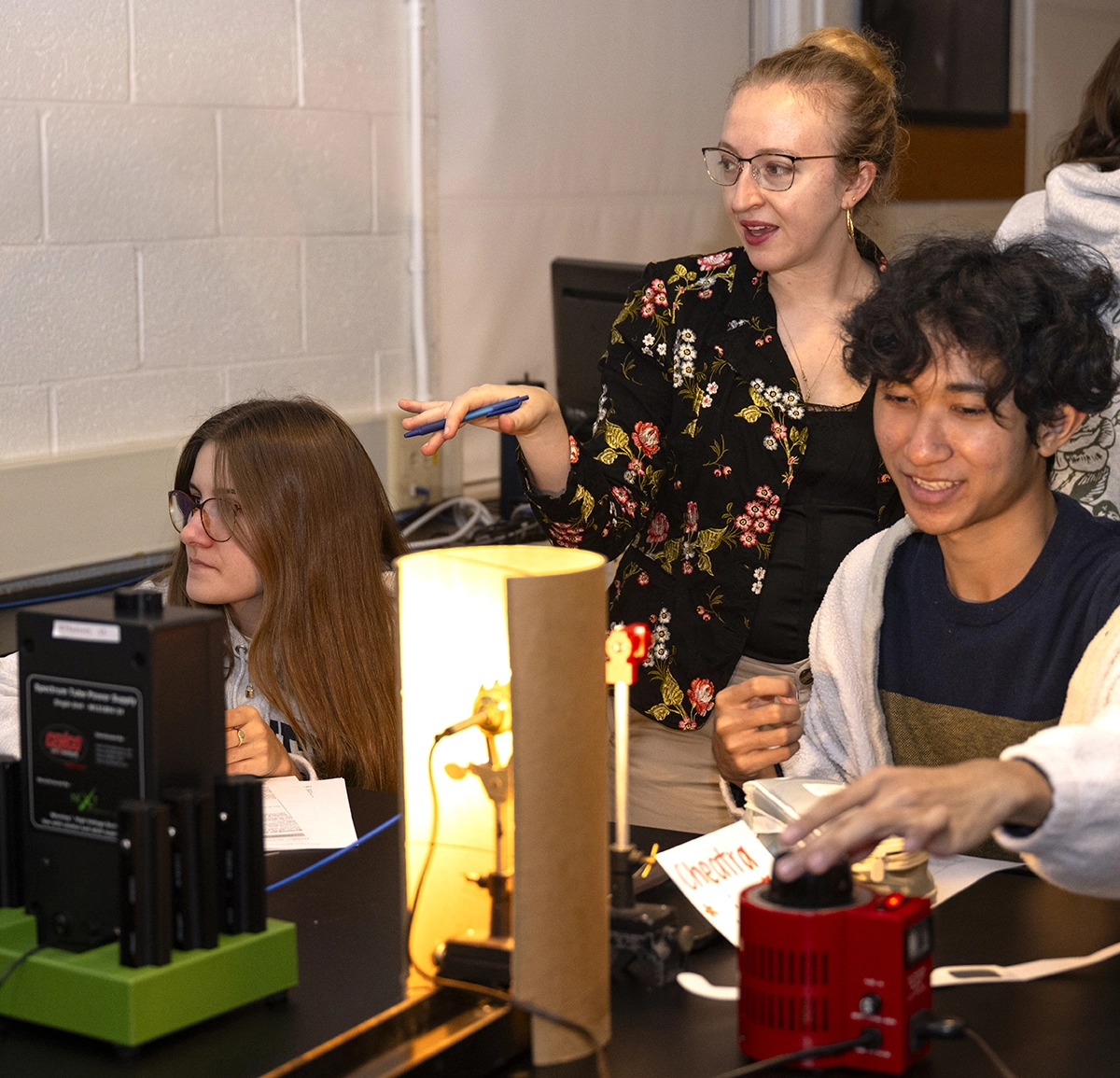
Trendspotter
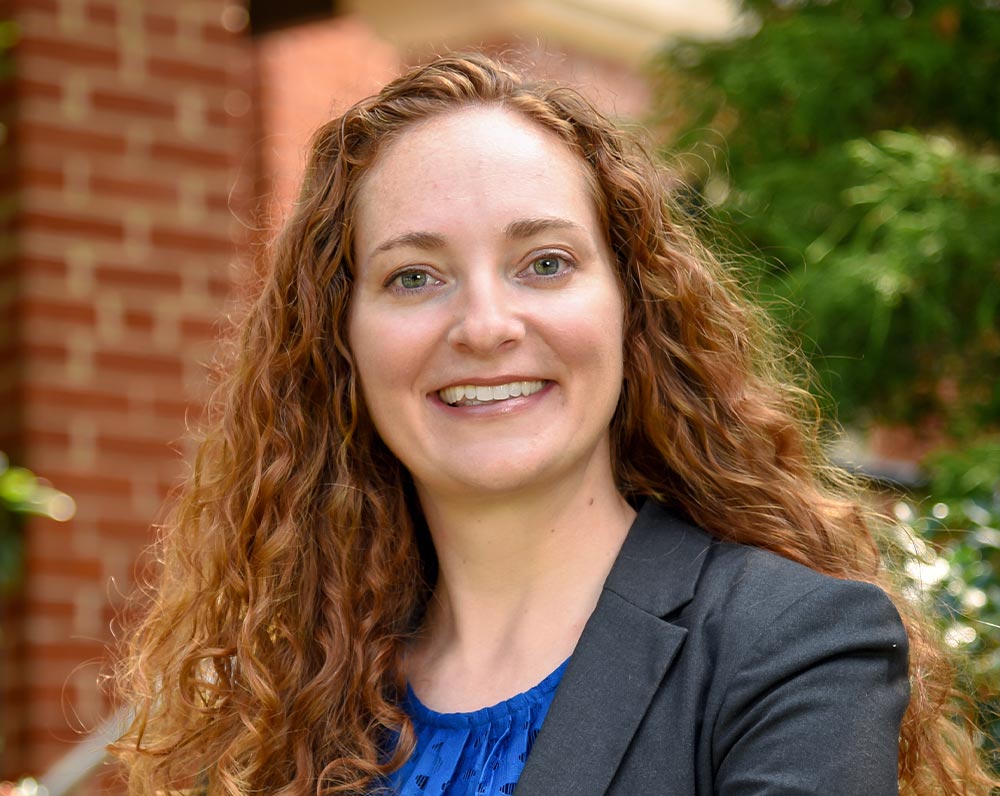
A Global Perspective
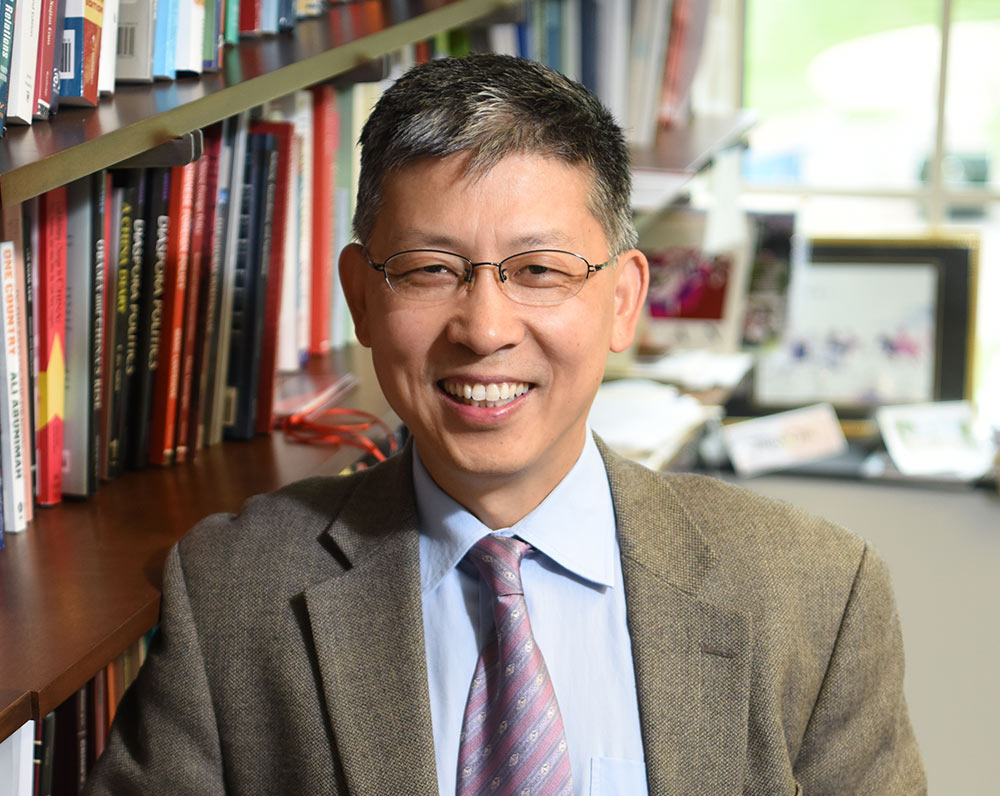
Professor Zhiqun Zhu, political science and international relations, is a noted scholar on Chinese foreign policy. This past year, Zhu provided analysis for stories on NPR and in Time, as well as internationally for Deutsche Welle, South China Morning Post and the China Global Television Network, among others.
Energizing Solutions
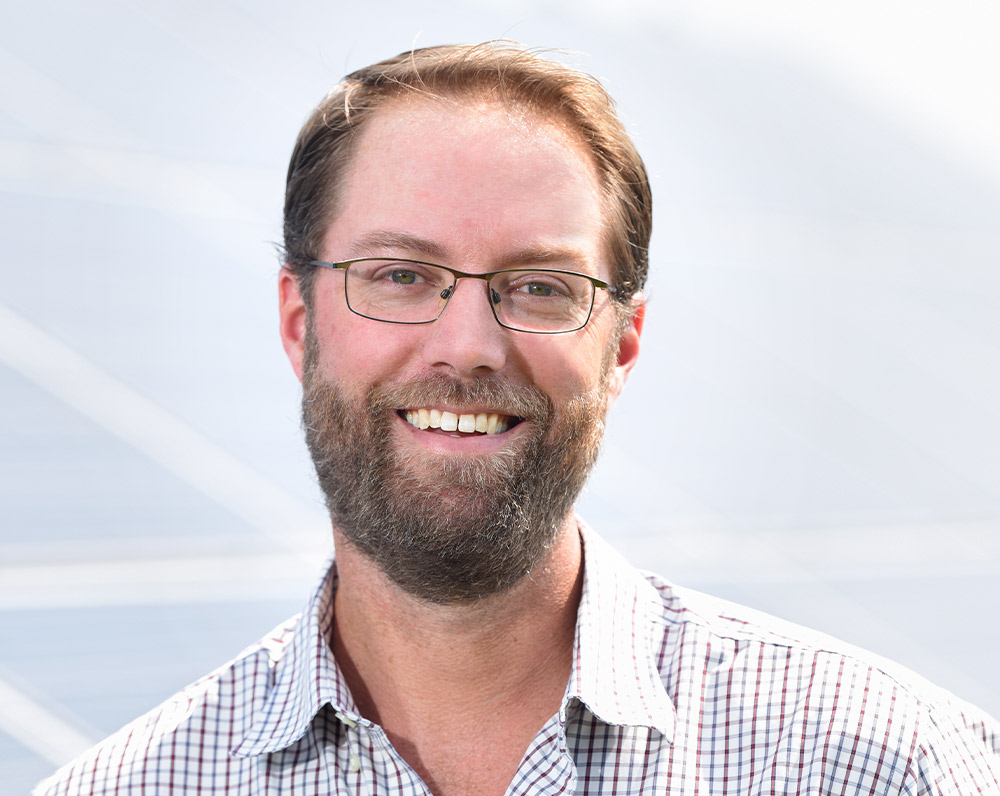
Listen and Learn
odcasts have experienced remarkable growth and popularity over the last decade, becoming a prominent medium for on-demand content. The format offers an opportunity to explore topics more deeply than in many traditional media, making them well-suited for faculty and administrators to share their expertise. Recent appearances include:
Professor Judy Grisel P’16, psychology
- Addiction (with Judy Grisel, Ph.D.)
Taboo Science - What Are the Root Causes of Drug Addiction? A Renowned Neuroscientist Explains
Finding Genius Podcast - The Neuroscience of Addiction with Dr. Judy Grisel
Psychology in Seattle
David Burpee Professor in Plant Genetics & Research Chris Martine, biology
- A Newly Identified Type of Tomato Has Been Hiding in Plain Sight
NPR Short Wave - Wild Tomatoes with Dr. Chris Martine, Dr. Tanisha Williams, Amy Wrobleski & Dr. Rebecca Bird
Foodie Pharmacology
Professor Sarah Lower, biology
- The Stars that Fly Among Us! (Fireflies with Guest Speaker Sarah Lower)
Insects for Fun!
These are just a few of the Bucknellians making waves on podcasts. Add our Bucknell Experts Spotify playlist to your library to keep up with their academic insights.
Innovation at Work: Learning Across Disciplines
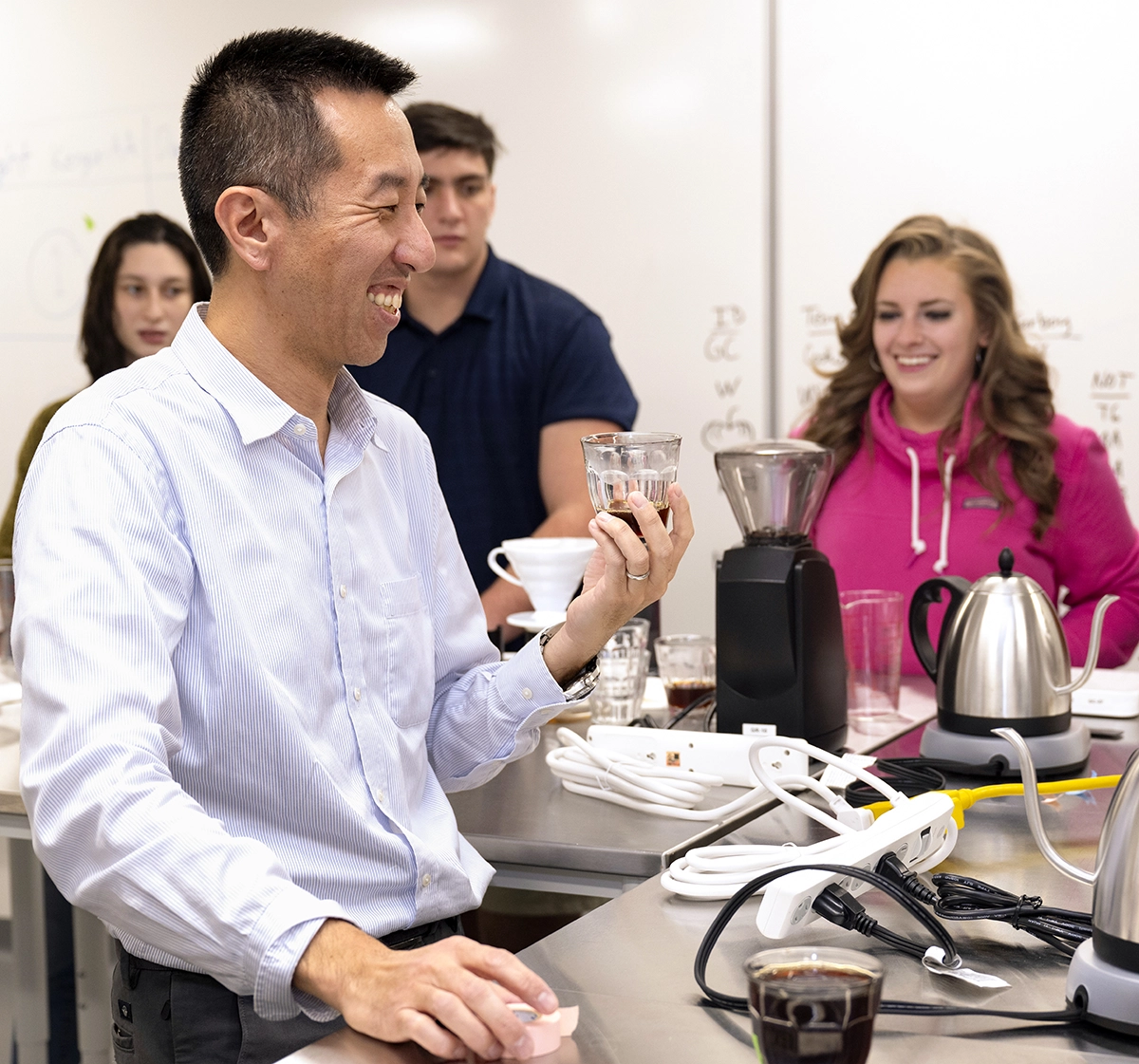
A Rich Blend
offee is a ubiquitous part of our culture that transcends its role as a caffeine source. It’s a centerpiece of social gatherings, a symbol of hospitality and a major global commodity.
Fueled by a mutual appreciation for the beverage, Professor Kat Wakabayashi, chemical engineering, and Visiting Assistant Professor Jonathan Scholnick, anthropology, recognized that coffee’s complex nature — which can be examined from a blend of perspectives including history, world cultures, anthropology, chemistry, environmental justice and economics — could be the focus of a comprehensive interdisciplinary initiative. The Bucknell Interdisciplinary Coffee Program provides a variety of learning opportunities for students via academic courses, research projects, community engagement activities and campus social experiences.
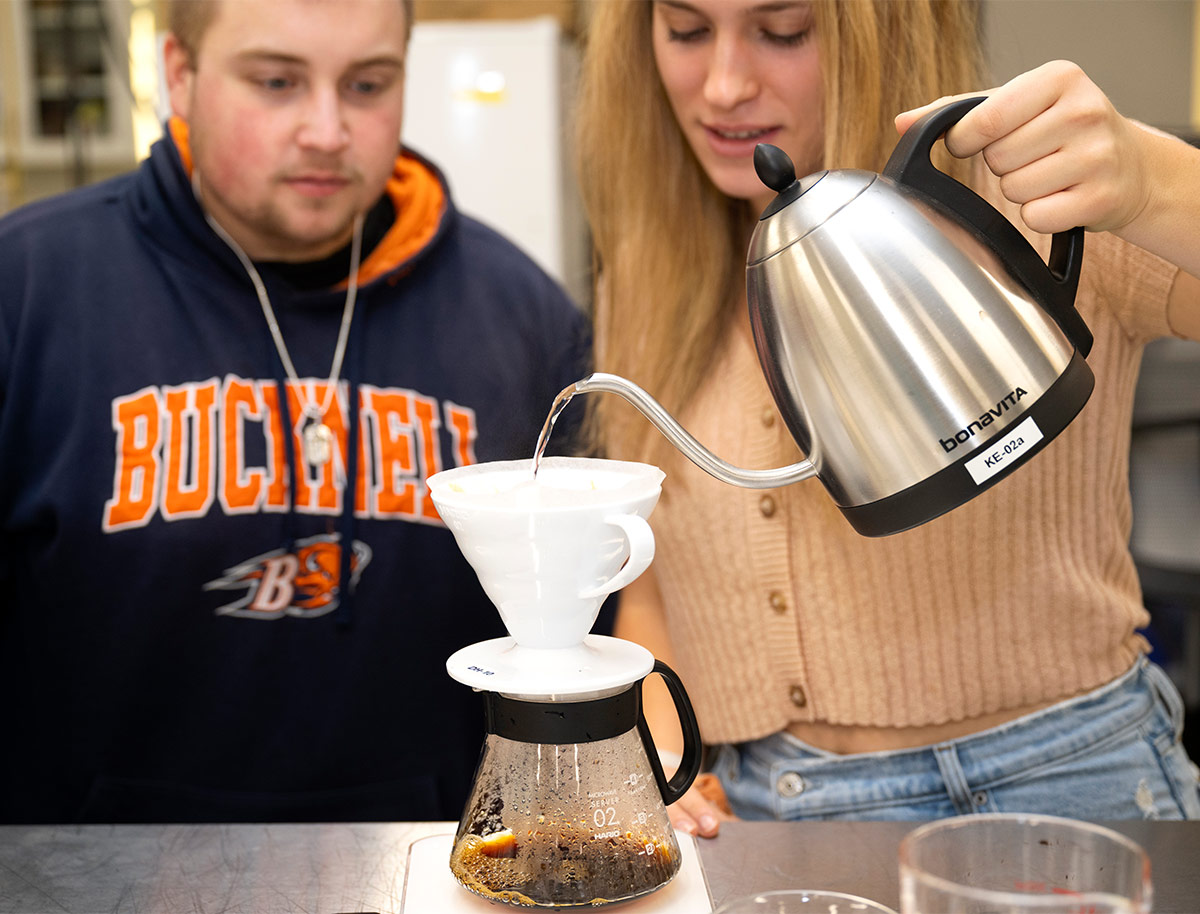
Wakabayashi and Scholnick are also involving students from different majors to conduct research on various aspects of coffee. Current investigations include recycling discarded coffee grounds as a bio-composite material used in compostable packaging, and capturing and analyzing the aroma of fresh coffee beans. “There’s a whole world behind a cup of coffee,” says Scholnick. “It’s everything from the history of how the plant is cultivated and grown, to the labor relations of the growers, to the way that coffee is marketed. All of these things are entangled in every cup you consume.”
Creating A Sound Design
hen the Lewisburg Children’s Museum asked Professor Haley Kragness, psychology, and Professor Gabriela Diego, markets, innovation & design (MIDE), for advice on creating a sound garden installation, the subject-matter experts could’ve answered the museum’s call for help themselves. But as educators, the professors saw a learning opportunity for their students to create a space that encourages musical exploration among the museum’s young visitors. Without a model to follow, they took on the challenge of co-leading a single project that spanned two different classes across two different colleges.
Kragness’ Psychology 207 students began by researching the physical and social development of the target audience: children ages 4 to 7. How high can they step? How do they interact with each other? They presented their findings to Diego’s MIDE 302 students, who applied that information to their designs.
Then it was Diego’s students’ turn to present their work to the psychology team for feedback. That iterative, collaborative process led to six proposals for a sound garden play area, which students pitched to museum representatives in December.
The experience enabled students to see the real-world implications of their work. It also exposed them to the realities of working across a multifaceted team. “To create a product that is meaningful to the user and relevant to the client, you have to consider input from all angles,” Diego says. “This process gave my students a more enriching academic experience.”
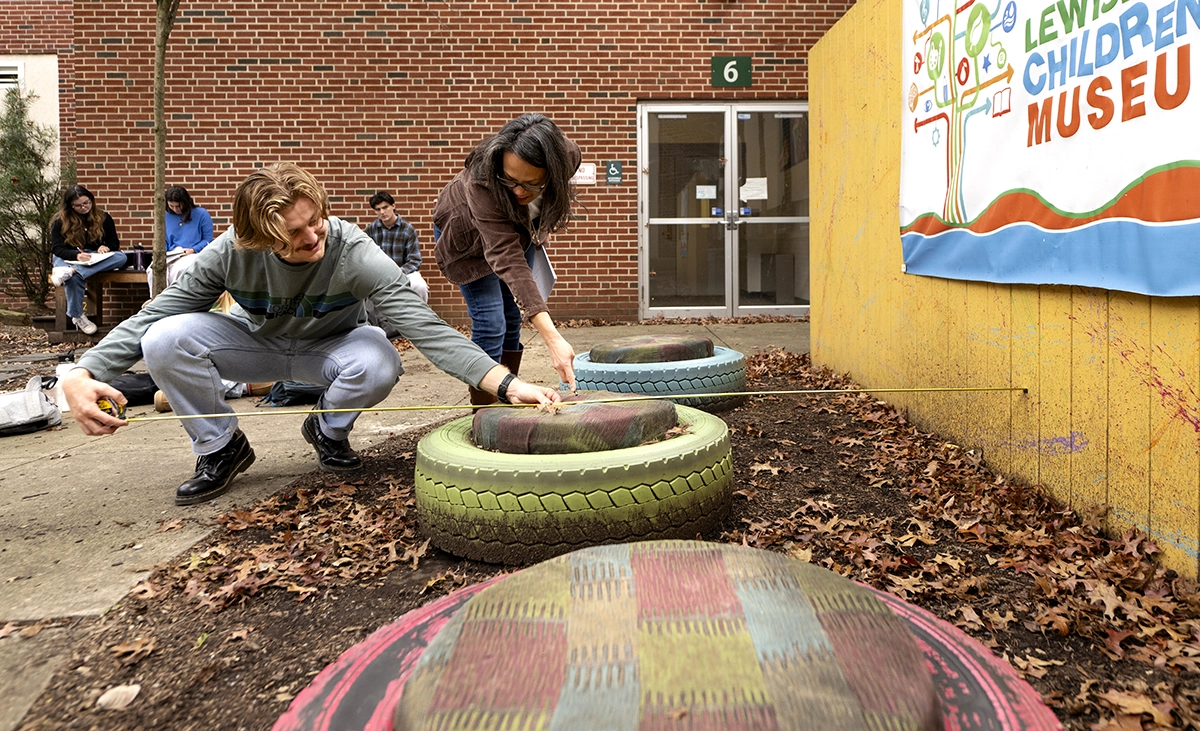
Cultivating Knowledge
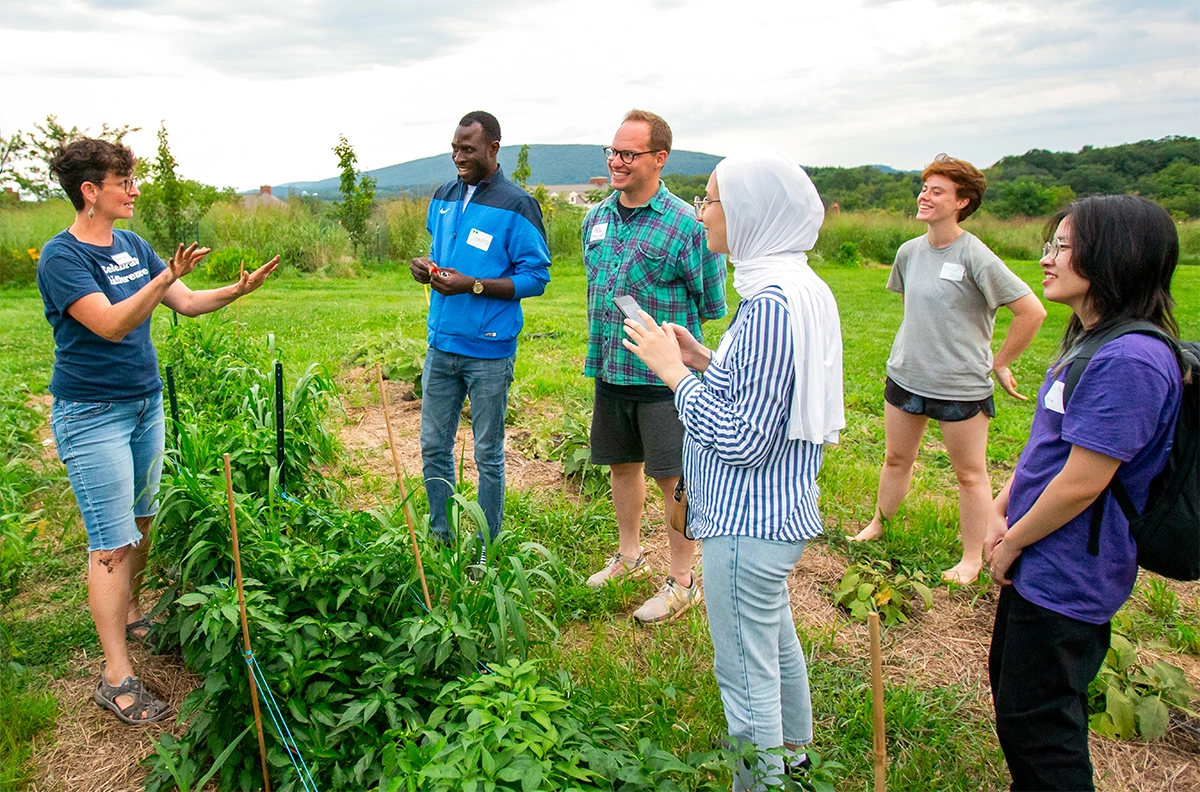
n the five years since the Bucknell Farm was established, it’s grown into a thriving living laboratory where students have the opportunity to learn about sustainable agriculture, make contributions that directly impact others and become engaged citizens who graduate ready to confront the environmental and societal challenges of the future.
Seventeen student farmers work at the 5-acre farm, which supplies nutritious produce — grown without the use of synthetic pesticides and fertilizers — to Bucknell’s campus food pantry and members of the local community. The farm also hosts weekly farm hours, which offer students the chance to roll up their sleeves and weed, plant and harvest while learning about regenerative farming and sustainable food systems.
But the farm does more than just grow fruit and vegetables and provide a social outlet in a serene setting. It serves as an extension of Bucknell’s classrooms. While biology and environmental science courses are a natural fit, faculty in a variety of diverse disciplines have creatively incorporated the farm into their coursework.
Just this past fall semester, 36 classes were held at the farm, says Professor Mark Spiro, biology, the farm’s faculty director. Among them: a classics professor teaching a course about the technology of growing food and the history of agriculture; a psychology professor examining nature’s role in child development; a Latin American studies professor exploring the relationship between land management and social exclusion; and an economics professor leading a discussion of how environmental issues impact the global economy.
The Bucknell Farm is a success story in progress with plenty of room to grow. The farm just underwent a master design process to identify facilities and infrastructure that will expand its capacity for year-round engagement. High on Spiro’s wish list is an additional passive greenhouse to extend the harvest season and an onsite net-zero-energy classroom that could accommodate classes through the winter season.
“The remarkable level of engagement is stretching the capacity of the farm. It’s a good problem to have,” Spiro says. “There is nothing but opportunity here.”
Financial Update

Strength of Support
- $14.9 million was designated to the Bucknell Annual Fund, providing vital resources to every student, program and department, every day.
- $3 million set the record for support for our athletics teams through the Bison Club.
- 39 new pledges of six figures and above were designated to enrollment efforts and financial aid, including a $10 million pledge.
- A founding gift launched the Dominguez Center for Data Science.
Bucknell Budget Summary
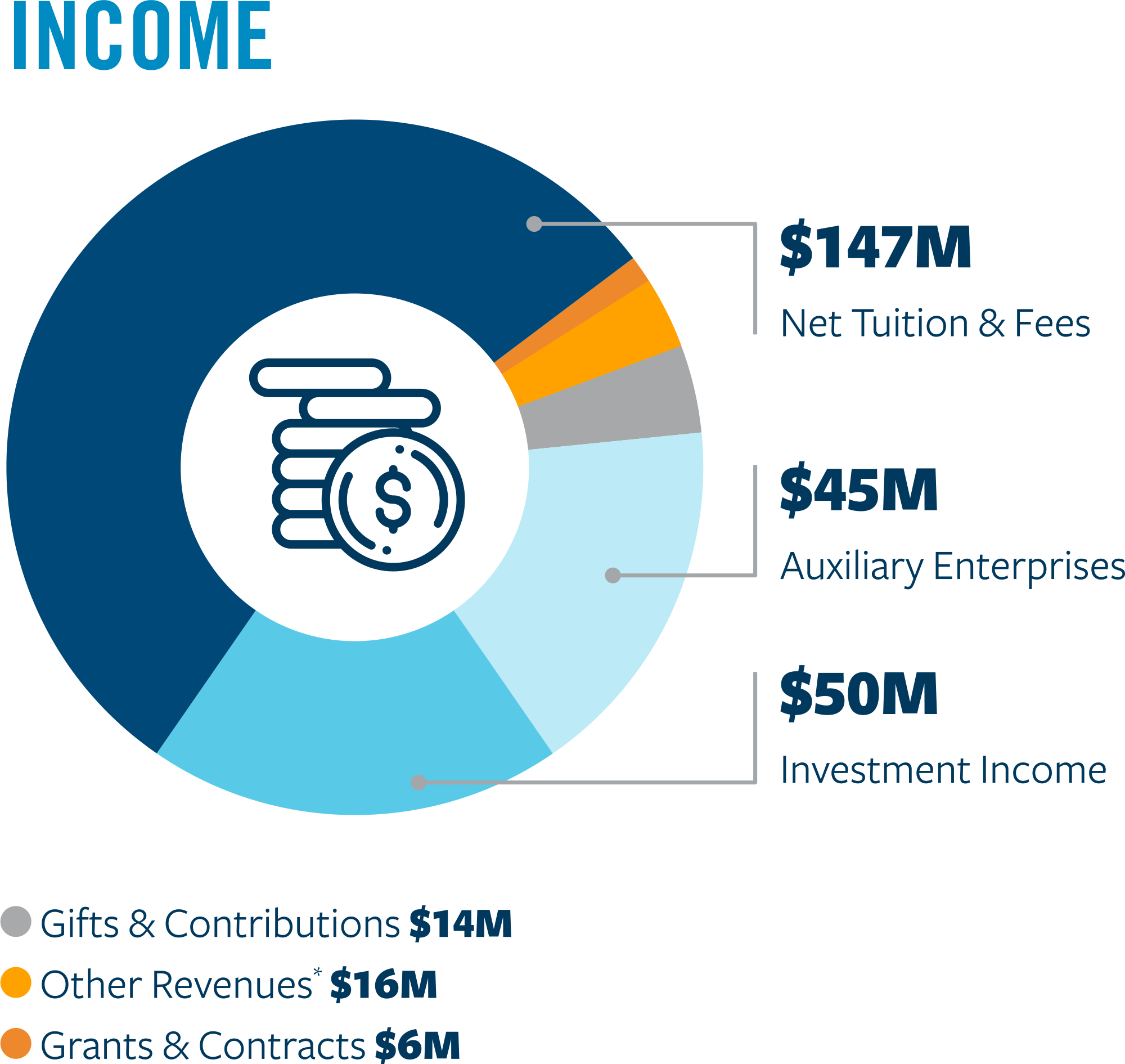
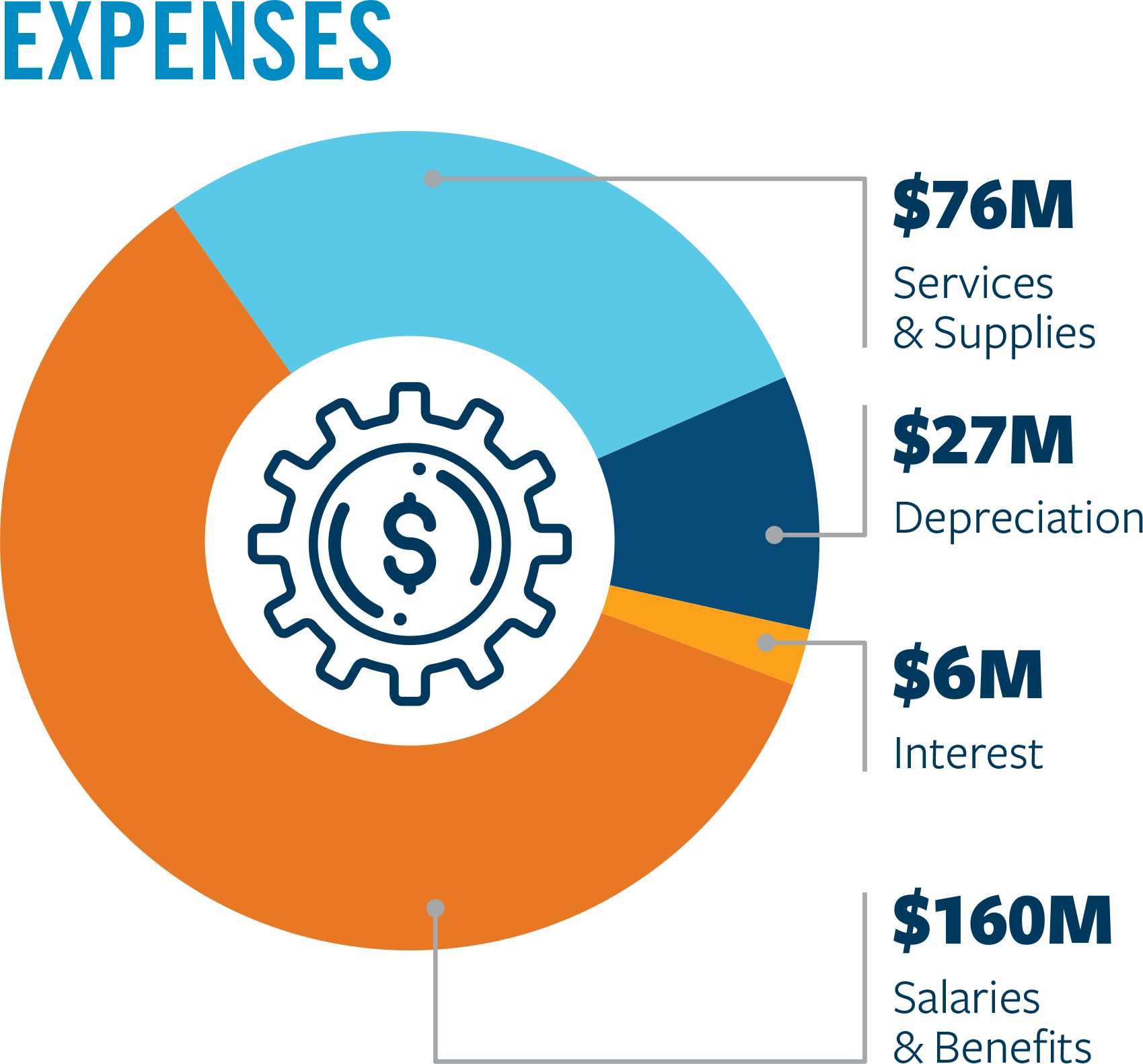
The Bucknell Endowment
Categorization of Endowments
Other University activities 37%
Instructional & academic programs 19%
Library 7% Athletics 2%
FY2023
1,207 Donor-endowed funds

University Leadership
- John C. Bravman, President
- Margot Vigeant, Interim Provost
- Param Bedi, Vice President and Chief Operating Officer
- Vernese Edghill-Walden ’87, Vice President of Equity & Inclusive Excellence
- Cindy Guthrie, Interim Dean of the Freeman College of Management
- Heather Johns P’27, Vice President for Marketing & Communications
- Lisa Keegan, Vice President for Student Enrollment, Engagement & Success and Interim Dean of Students
- Carol McLaughlin Kennedy ’96, Executive Director, Office of the President and University Secretary
- Jeffrey Loss, Associate Vice President for Facilities
- Brad Putman, Richard E. Garman Dean of the College of Engineering
- Karin Rilley, Vice President, General Counsel and Chief of Staff
- Scott Rosevear, Vice President for University Strategy & Advancement
- Jermaine Truax, Vice President and Director of Athletics
- Karl Voss, Douglas K. Candland Dean of the College of Arts & Sciences
- Nicole Whitehead, Vice President for Talent, Culture & Human Resources
Board of Trustees
- Carolyn Neely Ainslie ’80
- Daisy Auger-Dominguez ’95
- Dawn Becker ’85
- Keren Bergman ’88
- John C. Bravman, President Trustee
- J. Frank Brown ’78
- Tom Buchholz ’84
- Laureen Costa ’90, Assistant Secretary
- Frank Davis ’82, P’13
- Lisa Cadette Detwiler P’18
- Michael J. Dominguez ’91
- Annie Siebold Drapeau ’88, Vice Chair
- Brenda Earl ’81
- Mako Fujimura ’83, P’13
- Martin Gilliard ’99
- Robert Gilligan ’81
- Gene Gorab ’85, P’12, P’16
- Sunil Gulati ’81
- Donald Isken ’75, P’12, P’20
- Alexandra Ahrens Jung ’92
- Steve Kohn ’81, Vice Chair
- Bridget LaCroix Lecky ’09
- Jordy Leiser ’06
- Carolyn Speer Miles ’83
- Sam Nana-Sinkam Jr. ’10
- Chris O’Brien ’80, P’18, P’20, Chair
- Scott Perricelli ’94, P’25
- John Reynolds ’92
- Laurie Schmidt ’99
- Frank Schoeneman ’76, P’06
- Erika Stanat ’90
- Garry Thaniel ’04, Secretary
- Kecia Thomas ’88
- Scott Uebele ’00
- Kathryn Boselli Vizas ’79
- Audra Wilson ’94
- Robin Zafirovski ’79, P’09
photo by EMILY PAINE
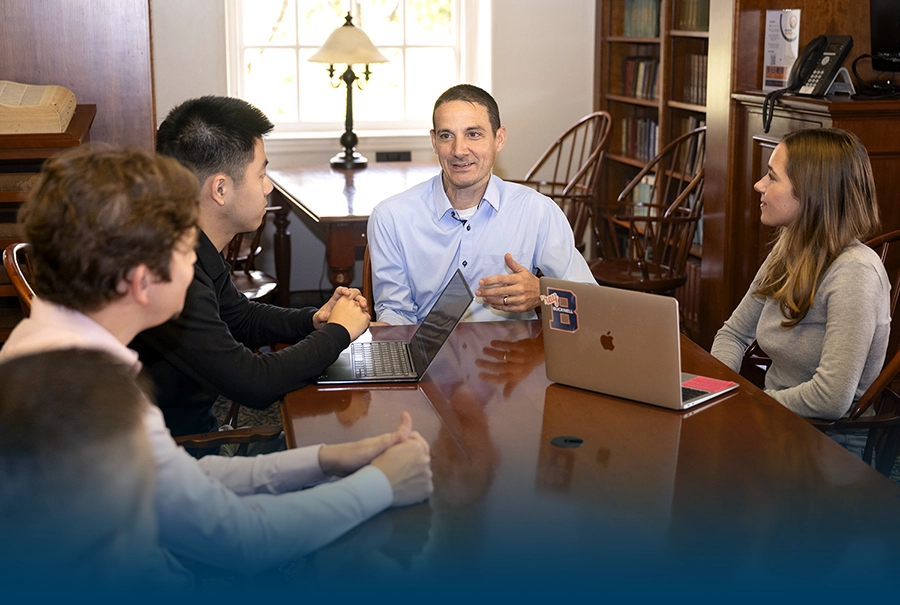
photo by EMILY PAINE

